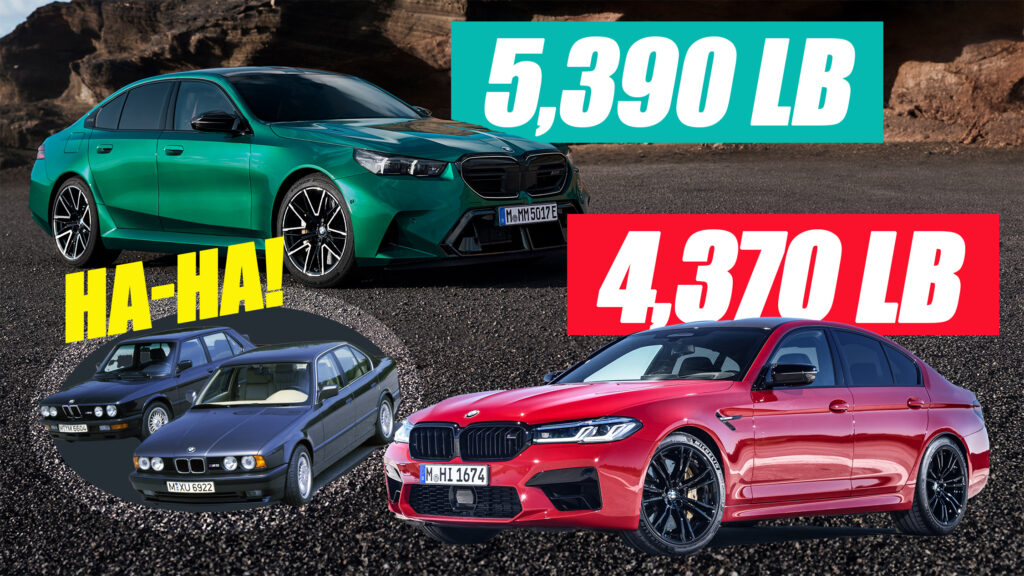- The 2024 BMW M5 is 24 percent heavier than its predecessor.
- Most of the added heft comes from the newly-incorporated plug-in hybrid drivetrain.
- The new M5 is heavier than the combustion-powered 760i xDrive sedan.
The epidemic of automotive weight gain is by no means a new phenomenon. A combination of mandated safety requirements, added luxury, and general bloating of all dimensions means that beloved models tend to put on the pounds over the years—much like the majority of us humans.
Ever since the first BMW M5 was introduced in 1984, every subsequent generation bar one has seen a steady increase in curb weight. However, never have we seen such a jump as witnessed between the outgoing G30 generation M5 and the incoming 2025 F90 M5.
More: 2025 BMW M5 Embraces Hybrid Power With 717 HP, But Is Slower Than Previous Gen
Tipping the scales at 5,390 lbs (2,445 kg), the new M5 is not only 1,020 lbs (463 kg) heavier than the car it replaces. It’s even heavier than the company’s flagship executive, the 760i xDrive (4,969 lbs / 2,254 kg). To add a little more perspective, the M5 is now roughly the same weight as a Ford F-150 Supercrew with the hybrid V6 (5,260–5,517 lbs), meaning many F-150 trims are actually lighter.
It represents the single biggest weight increase in the history of the model, with the electrified M5 around 24 percent heavier than its direct predecessor. The new M5 is 1,020 lbs (463 kg) heavier than the car it replaced. That’s the biggest jump we’ve seen from the model, although the gulf between the original E28 M5 and the E34 M5, which was around 740 lbs heavier, was almost as bad.
Comparison
However, this added weight, hybrid or not, appears to be a systemic problem within BMW. Granted, the M5 has never really been considered a lightweight option. Bar a few stripped-out track-oriented versions, like the E34’s 20 Jahre special edition; the emphasis has always been about balancing luxury with performance.
But the M5 is a porker, no matter what way you look at it. And it’s the latest in a long line of overweight M-Division BMWs, which started with the 3,814 lbs (1,730 kg) BMW M2, and topped out with the 6,062 lbs (2,750 kg) XM.
Read: The 6,000 Lbs BMW XM Label Red Is MotoGP’s 2024 Track Safety Car
Evidently, the inclusion of the hybrid tech and batteries added a substantial amount of weight to the M5. But we can’t help wonder how this will translate into spirited and track-oriented driving — things that the model has been known to ace in the past.
So, over to you, readers. Does the added weight of the new BMW M5 hybrid bother you, or are you more impressed by the headline power output? Let us know your opinion in the comments below.




